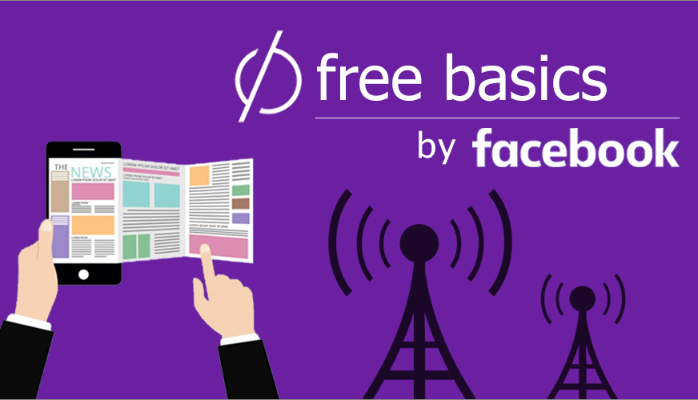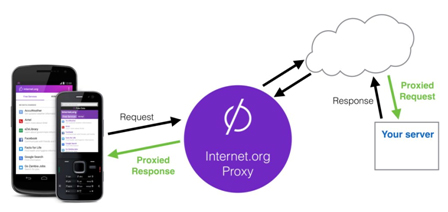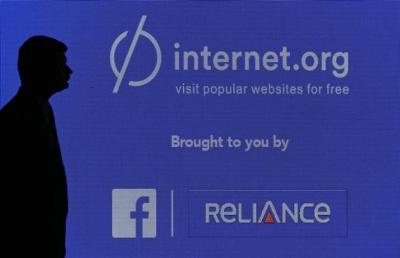
IT Can Be Trap For Indians
What is Free Basic?
Free Basics is a program by Facebook where they make a deal with the Telecom Operators like Reliance etc to provide the said Telco’s millions of customers free(as in without paying for it) access to a handful of websites from the Internet. These websites are handpicked by Facebook itself. (If you want your website to show up to these millions of people, you have to apply for it and it has to get approved by Facebook). These websites may include news, health-care, education, public service related websites. Those too are chosen by Facebook.
Are you Aware?
When you use Free Basics, you never leave Facebook’s domain. Any website that is available to Free Basics, is read by Facebook and then shown to you on the Free Basics domain itself. Your original request never even touch the website you’re trying to reach. This is what Facebook wants. For you to never leave Facebook.
When you say “news providing website”, you are thinking about the news sites that you trust and know that provide almost impartial news. But what if the sites you trust don’t apply for the Free Basics program? What if that other site that you know provides misinformation, does apply for Free Basics and gets access to it? Exactly the same with all the other category. If anyone ever wanted to control information for Billions of people, they’d choose Free Basics. That’s the potential use of Free Basics.
It means that all your requests go through Facebook’s proxy server. Facebook says that, it is so that the requests and responses are optimized for mobile access. But that also means that Facebook reads everything and can tamper with everything.
Facebook’s primary business is data collection and information control. Facebook is not about connecting people. Facebook wants everyone using the Internet to have a Facebook profile and have their activities monitored. Want proof?
- Facebook has a real name and real date of birth policy. You have to use your real name and DOB. They dont let you change your name and DOB more than 3-5 times. Once you touch that limit, you can never change them back. And they often lock people out of their account in suspicion that they are not real people. The only way to get their account unlocked is to mail Facebook a copy of your Government provided ID card(!).
- Most people use Facebook from smartphones nowadays. And the Android/iPhone app of Facebook requires access to your –
- all contacts
- camera and microphone
- location
- SMS
- calendar
- call records
- photos/videos
- device ID
- anything else you can think of
- Facebook bought WhatsApp, the most used messaging app on smartphones (to know what you talk about)
- Facebook bought Instagram, the most used “social” image sharing app (to know what you’re interested in)
- Facebook can automatically tag people on their uploaded photos, meaning that they run facial recognition on any photo uploaded on Facebook (to know who you are with and where you’ve been.
Facebook wants people to keep using Facebook. Social networking sites don’t live forever. Remember MySpace? Or Orkut? Facebook doesn’t want to be yet another Orkut. So they are doing everything in their might to become irreplaceable. Which they will be for a billion Indians if Free Basics gets through. This is the ticket to Facebook’s survival for next 10 years.
Facebook will know your habits, your thinking patterns and behavioral patterns. International ecommerce websites like Target has already shown what can be done with patterns like that (TL;DR, they predicted a teen’s pregnancy from her shopping patterns and informed her parents before she did).
Your daily browsing patterns reveal more about you than you think. From health issues to social issues, Internet usage patterns can reveal everything. This is why data collection/mining is so attractive among companies like Facebook, Twitter or Google.
Facebook having the ability to reject applications also mean that if your friend wants to get his new ecommerce startup listed in Free Basics, they can’t, if Free Basics’ current partner ecommerce website don’t want that. Also, Facebook is not charging anything to the websites from listing themselves in Free Basics, but they have Never said that they will Never charge them. So at that point, only the websites who can afford the access to Free Basics, will be available to the Free Basics users. If your friend can’t afford that, then tough luck.
Allowing a private entity
- to define for Indian Internet users what is ‘basic’,
• to control what content costs how much, and
• to have access to the personal content created and used by millions of Indians
is a lethal combination which will lead to total lack of freedom on how Indians can use their own public utility, the Internet. Facebook’s ‘free basics’ proposal is such a lethal combination, having several deep flaws, beneath the veil of altruism wrapped around it in TV and other media advertisements, as detailed below.
Flaw 1: Facebook defines what is ‘basic’.
The first obvious flaw in the proposal is that Facebook assumes control of defining what a ‘basic’ service is. They have in fact set up an interface for services to ‘submit’ themselves to Facebook for approval to be a ‘basic’ service. This means: what are the ‘basic’ digital services Indians will access using their own air waves will be decided by a private corporation, and that too one based on foreign soil. The sheer absurdity of this is too obvious to point out.
Also see: Facebook’s Free Basics: 9 Indian startup CEOs jointly write to TRAI chairman against it
To draw an analogy, suppose a chocolate company wishes to provide ‘free basic food’ for all Indians, but retains control of what constitutes ‘basic’ food — this would clearly be absurd. Further, if the same company defines its own brand of ‘toffee’ as a ‘basic’ food, it would be doubly absurd and its motives highly questionable. While the Internet is not as essential as food, that the Internet is a public utility touching the lives of rich and poor alike cannot be denied. What Facebook is proposing to do with this public utility is no different from the hypothetical chocolate company. In fact, it has defined itself to be the first ‘basic’ service, as evident from Reliance’s ads on Free Facebook. Now, it will require quite a stretch of imagination to classify Facebook as ‘basic’. This is why Facebook’s own ad script writers have prompted Mr. Zuckerberg to instead make emotional appeals of education and healthcare for the poor Indian masses; these appeals are misleading, to say the least.
Flaw 2: Facebook will have access to all your apps’ contents.
The second major flaw in the model, is that Facebook would be able to decrypt the contents of the ‘basic’ apps on its servers. This flaw is not visible to the lay person as it’s a technical detail, but it has deep and disturbing implications. Since Facebook can access un-encrypted contents of users’ ‘basic’ services, either we get to consider health apps to be not basic, or risk revealing health records of all Indians to Facebook. Either we get to consider our banking apps to be not ‘basic’, or risk exposing the financial information of all Indians to Facebook. And so on. This is mind boggling even under normal circumstances, and even more so considering the recent internal and international snooping activities by the NSA in the US.
Must read: Facebook Free Basics controversy: Here’s what has happened so far
Flaw 3: It’s not free.
The third flaw is that the term ‘free’ in ‘free basics’ is a marketing gimmick. If you see an ad which says ‘buy a bottle of hair oil, get a comb free’, you know that the cost of the comb is added somewhere. If something comes for free, its cost has to appear somewhere else. Telecom operators will have to recover the cost of ‘free basic’ apps from the non-free services (otherwise, why not make everything free?). So effectively, whatever Facebook does not consider ‘basic’ will cost more.
If Facebook gets to decide what costs how much, in effect Indians will be surrendering their digital freedom, and freedom in the digital economy, to Facebook. So this is not an issue of elite Indians able to pay for the Internet versus poor Indians, as Facebook is trying to portray. It is an issue of whether all Indians want to surrender their digital freedom to Facebook.
Also see: TRAI floats new Consulation paper, lists disadvantages of zero-rating plans
That the ‘Free Basics’ proposal is flawed as above is alarming but not surprising, for it violates one of the core architectural principles of Internet design: net neutrality. Compromising net neutrality, an important design principle of the Internet, would invariably lead to deep consequences on people’s freedom to access and use information. We therefore urge that the TRAI should support net neutrality in its strongest form, and thoroughly reject Facebook’s ‘free basics’ proposal.
A Facebook Inc.-backed service that offered free, limited access to the Internet in Egypt has been shut down, a spokeswoman said.
The “Free Basics” service was shut down in Egypt on Dec. 30, about two months after Facebook launched the service there with mobile carrier Etisalat. About 3 million Egyptians used the “Free Basics” service, including more than one million people who didn’t previously use the Internet, a Facebook spokeswoman said.
“We’re disappointed that Free Basics is no longer available in Egypt as of Dec. 30, 2015,” she said. “We are committed to expanding Internet access to the unconnected in Egypt and around the world and hope to resolve this situation soon.” About 32% of Egypt’s nearly 90 million people had access to the Internet in 2014, according to data from the World Bank.
It is unclear why the app was shut down in Egypt. The move comes less than a month before the fifth anniversary of the Arab Spring uprising that forced then-President Hosni Mubarak to step down. Social media sites, including Facebook, played a key role in helping protesters mobilize.
Free Basics is the keystone of a broader, controversial Facebook effort called Internet.org to extend Web access to billions of unconnected people. Users can use the Free Basics app and website to access certain web sites and services, including Facebook and the BBC News, without incurring data charges. But content providers must apply to and be approved by Facebook to be accessible.
This push has generated significant controversy, particularly in India, where critics say the effort is forcing users into a version of the Internet that is mediated entirely by Facebook. Facebook CEO Mark Zuckerberg has defended the effort several times in the last year, saying some Internet is better than none for the billions without the web.
“If we accept that everyone deserves access to the internet, then we must surely support free basic internet services,” Mr. Zuckerberg said in an op-ed in the Times of India this week. “That’s why more than 30 countries have recognized Free Basics as a program consistent with net neutrality and good for consumers. Who could possibly be against this?”
Tim Berners-Lee invented the World Wide Web, so it’s safe to assume he knows what he’s talking about.
Berners-Lee was speaking at the Web We Want Festival in London’s Southbank. According to the Guardian, the Web We Want campaign promotes five key principles for the future of the web: Freedom of expression online and offline, affordable internet access, protection of user data and privacy, a decentralised internet infrastructure, and net neutrality.
Speaking about net neutrality in particular, Berners-Lee said: “I tend to say ‘just say no’” when it comes to compromising on it.
He said:
“In the particular case of somebody who’s offering … something which is branded internet, it’s not internet, then you just say no. No it isn’t free, no it isn’t in the public domain, there are other ways of reducing the price of internet connectivity and giving something … [only] giving people data connectivity to part of the network deliberately, I think is a step backwards.”
To Read More: http://www.hindustantimes.com/tech/the-father-of-the-internet-wants-you-to-just-say-no-to-facebook-s-free-basics/story-o2MMpHDiNsZqli2OmbPTFL.html
We are free to use Internet and Internet is the place where we connect many people instantly and do various things, and providing our thoughts. Does facebook internet.org affecting our net neutrality? We have collected various information which we shared here to give you the perspective in details and various link of the article on it. It can be good somewhat if we want to expand our reach but is this the only way to reach out the Internet to people who cannot afford? What are the interests Facebook and Telecom company has? Think about it after all its about freedom.



